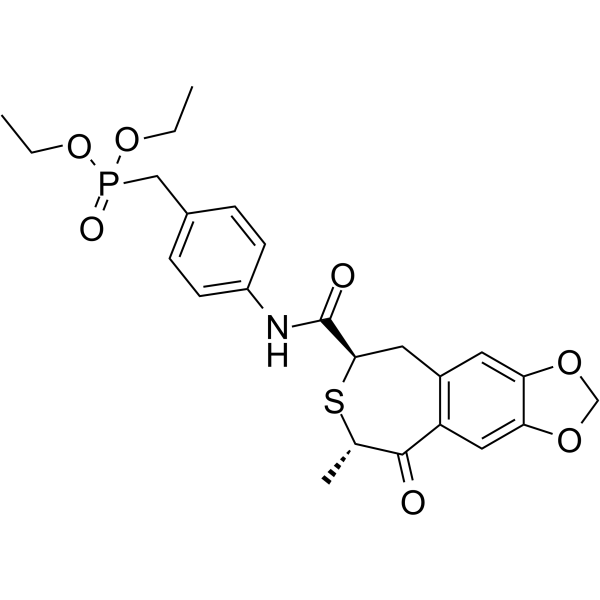上海金畔生物科技有限公司为生命科学和医药研发人员提供生物活性分子抑制剂、激动剂、特异性抑制剂、化合物库、重组蛋白,专注于信号通路和疾病研究领域。
TAK-778
TAK-778 是依普黄酮的衍生物,已显示在体外和体内模型中能诱导骨生长。

TAK-778 Chemical Structure
CAS No. : 180185-61-9
| 规格 | 是否有货 | ||
|---|---|---|---|
| 100 mg | 询价 | ||
| 250 mg | 询价 | ||
| 500 mg | 询价 |
* Please select Quantity before adding items.
| 生物活性 |
TAK-778 is a derivative of ipriflavone and has been shown to induce bone growth in in vitro and in vivo models. |
|---|---|
| 体外研究 (In Vitro) |
TAK-778 is a derivative of ipriflavone and has been shown to induce bone growth in in vitro and in vivo models. Continuous treatment with TAK-778 (10 μM) for 1 to 21 days results in an increase in the area of mineralized nodules. TAK-778 at concentrations of 1 μM and higher significantly stimulates the activity of cellular Alkaline phosphatase (ALP). TAK-778 increases slightly but significantly the DNA content of the cells at the confluence stage. Treatment with TAK-778 also results in dose-dependent increases in the amount of soluble collagen and osteocalcin secreted into culture medium from days 5 to 7. TAK-778 enhances the secretion of both TGF-β and IGF-I at every time point during the 21 days of culture. Treatment of the cells with TAK-778 does not induce ALP activity, but does result in a dose-dependent increase in the saturated cell density. TAK-778 at a concentration of 10 μM significantly reduces the saturated cell density[2]. 上海金畔生物科技有限公司 has not independently confirmed the accuracy of these methods. They are for reference only. |
| 体内研究 (In Vivo) |
Treatment with a single local application of TAK-778/PLGA-MC (0.2 to 5 mg/site) results in a dose-dependent increase in the radio-opaque area formed in the defect. Histological studies show the defect area is occupied by a bony bridge and the newly-formed radio-opaque area corresponds to a calcified bone containing bone marrow cavities surrounded by thick osteoid seams with cuboidal osteoblasts. There is no significant difference in either of the indices between placebo- or TAK-778/PLGA-MC-treated skulls. Two months after the operation, the TAK-778/PLGA-MC pellets induce radiological osseous union across the defects[2]. Oral treatment of OVX rats with TAK-778 causes a more pronounced increase in bone mineral density (BMD) of the lumbar vertebrae compare to vehicle controls[3]. 上海金畔生物科技有限公司 has not independently confirmed the accuracy of these methods. They are for reference only. |
| 分子量 |
505.52 |
| Formula |
C24H28NO7PS |
| CAS 号 |
180185-61-9 |
| 运输条件 |
Room temperature in continental US; may vary elsewhere. |
| 储存方式 |
Please store the product under the recommended conditions in the Certificate of Analysis. |
| 参考文献 |
|
| Cell Assay [1] |
Human bone marrow cells are used and cultured in α-MEM supplemented with 10% fetal bovine serum, 50 mg/mL gentamicin, 0.3 mg/mL fungizone, 100 nM Mdexamethasone, 5 mg/L ascorbic acid, and 7 mM bglycerophosphate. Subconfluent cells in primary culture are harvested after treatment with 1 mM EDTA and 0.25% trypsin and the first passage is subcultured in 24-well culture plates at a cell density of 2×104 cells/well in culture medium containing the same volume of TAK-778 (10 μM), Tamoxifen (10 μM), and TAK-778 (10 μM)+Tamoxifen (10 μM). Cells subcultured in medium supplemented with vehicle are used as a control. During the culture period, cells are incubated at 37°C in a humidified atmosphere of 5% CO2 and 95% air, and the medium is changed every 3 or 4 days[1]. 上海金畔生物科技有限公司 has not independently confirmed the accuracy of these methods. They are for reference only. |
|---|---|
| Animal Administration [3] |
Eight-week-old female Wistar-Imamichi rats are used in this study. Forty Wistar-Imamichi rats are divided into sham-operated, vehicle, TAK-778, tamoxifen, and combination (TAK-778 and tamoxifen) treatment groups. Two weeks after ovariectomy, animals are orally administered TAK-778 [100 mg/kg body weight (BW), three times per week] and/or tamoxifen (200 mg/kg BW, three times per week) for 3 months. Rats orally administered vehicle and sham operated rats serve as controls. On 13 and 3 days before killing, tetracycline (30 mg/kg BW) or calcein (5 mg/kg BW) is injected subcutaneously, and lumbar vertebrae (L2-L5) are removed for bone analysis[3]. 上海金畔生物科技有限公司 has not independently confirmed the accuracy of these methods. They are for reference only. |
| 参考文献 |
|
所有产品仅用作科学研究或药证申报,我们不为任何个人用途提供产品和服务
